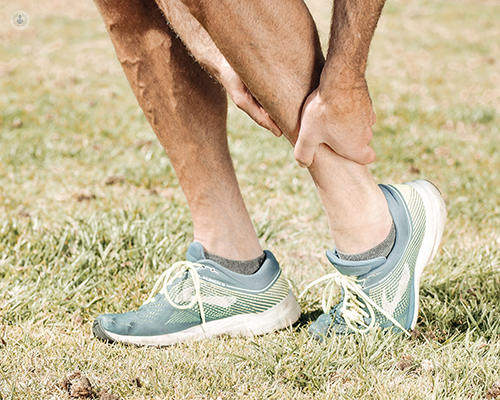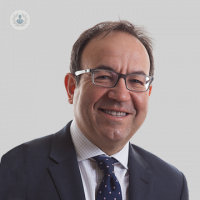Achille's Rupture - Causes, symptoms and treatment
Escrito por:The Achilles tendon is thickest cord in the human body, which connects the calf muscles to the heel bone. Achilles ruptures can happen to people of all ages; however, they are most common in amateur athletes between the ages of thirty and fifty. This type of injury happens to less than 0.01% of the general population, with only a slight increase when professional athlete incidences are included. Orthopaedic surgeon Jordi Sanchez-Ballester sheds more light on causes, symptoms, treatment and more.

How do Achilles injuries occur?
This type of injury usually occurs due to stress placed on the ankles and feet during sport and other strenuous exercises, but some less likely causes are:
• Increasing age
• Chronic/recurrent Achilles’ tendinopathy.
• Steroids
• Systemic corticosteroids (prolonged or high doses) or Cushing's syndrome
• Previous steroid injections into or around the Achilles tendon
• Gout, rheumatoid arthritis, systemic lupus erythematosus
• Quinolone antibiotics
What are the signs of a ruptured achilles?
Sufferers of this injury will usually feel a sharp, sudden pain, often described as feeling similar to being hit on the back of the leg, which later settles into a lighter ache. In some cases, a snapping sound can be heard as the tendon tears, while there is usually some bruising and swelling to the back of the ankle. If the tendon has been strained before the rupture incident, a less intense pain may be felt.
If this happens, we would recommend avoid non-weight bearing and attend for urgent medical advice. This is important as delayed treatment has unfavourable consequences.
Treatment Options
The first and most vital treatment once this type of injury is identified or suspected is rest the affected foot and avoid putting weight on it, before seeking medical advice. Doctors may assess the injury using MRI or Ultrasound scanners, particularly when it’s hard to identify whether the tendon has been completely or just partially ruptured.
For non-professional and/or older sport patients especially, rest is recommended in order to aid recovery of the tendon. This means minimal walking, standing and weight bearing on the affected foot. A walking boot and pain killing measures may also be offered to some patients to help speed up the process. Once walking and weight bearing can be tolerated, physiotherapy is offered to help guide ankle movement.
Surgery is usually only offered to those with more complicated ruptures, which don’t appear likely to heal without it, as well as athletes and those who participate in a high level of physical activity.
While there are various approaches to rehabilitation, a period of non-weight bearing and a brace or plaster cast are necessary for all patients. It is believed that using a brace, rather than a plaster cast reduces complications.
Complications
• Scarring and contracture of the Achilles tendon is fairly common due to the extended period of immobility caused by the injury and surgery rehabilitation. For this reason, it’s important for patients to begin mobility and rehabilitation exercises as soon as possible, in order to give yourself the best chance of regaining full range of movement.
• There is a risk of the tendon rupturing again, although studies suggest that the possibility is lower after surgery, as opposed to conservative treatment. However, surgery does carry the additional risk of wound infection.
• Deep vein thrombosis is known to occur in a large number of cases.
Prognosis
For the general population, Achilles tendon rupture has a fairly good prognosis, particularly for those how don’t participate in much sport. For competitive athletes, the loss of function can be crucial, which is why surgery is almost always performed in these cases. Even with surgery, athletes may not be able to compete for up to a year.
Mr Jordi Sanchez-Ballester is a consultant orthopaedic surgeon based in St Helens and Warrington, you can get in touch with him to request a consultation here.


